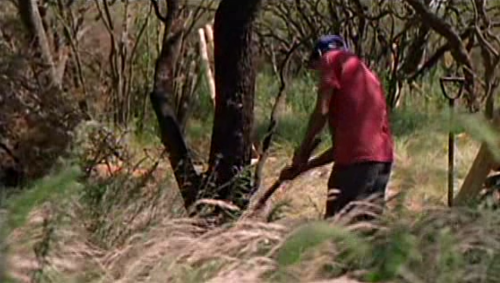In Lisandro Alonso's La libertad, a man cuts down trees, strips their bark and puts the wood in
piles, before loading it into a borrowed pick-up truck and delivering it.
Throughout this process, he meets four people: the owner of the pick-up truck
and his young son, a shop assistant, and a businessmen who buys and sells the
wood; aside from some half-hearted haggling, they barely exchange words. These
words, though, are the only clue as to the film's location. Of course, the
likeliest setting for the film is Alonso's native Argentina, but this narrative
exists with so little context that it could easily be happening anywhere in the
world; and at any time: the pick-up truck, a portable radio, and a chainsaw providing
the only (vague) suggestions of a time-period.
Instead of (overtly, at least) attributing some kind of socio-political significance
to this woodcutter and his work, Alonso devotes the entirety of the film to his quotidian routine, mostly observing with a free-wheeling, constantly-mobile
camera that centres him in the frame even as his work takes him elsewhere; and sometimes
Alonso ignores the work altogether and simply watches as the wind passes
through the trees, or as the woodcutter finds the perfect place to take a shit.
In this sense, La libertad, which
translates as "freedom", is a fitting title: Alonso is tied to
nothing, and his film is as boundless as narrative cinema can be. But La libertad's cyclical structure and the
tedious, repetitive routine it depicts suggests that this freedom is perhaps not
as liberating as it seems.

